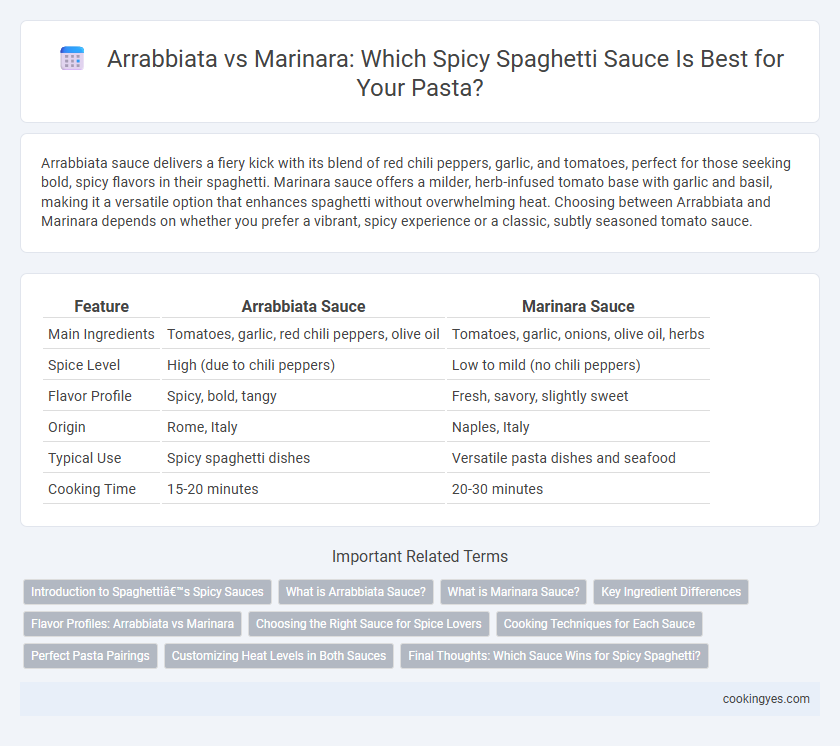Arrabbiata sauce delivers a fiery kick with its blend of red chili peppers, garlic, and tomatoes, perfect for those seeking bold, spicy flavors in their spaghetti. Marinara sauce offers a milder, herb-infused tomato base with garlic and basil, making it a versatile option that enhances spaghetti without overwhelming heat. Choosing between Arrabbiata and Marinara depends on whether you prefer a vibrant, spicy experience or a classic, subtly seasoned tomato sauce.
Table of Comparison
| Feature | Arrabbiata Sauce | Marinara Sauce |
|---|---|---|
| Main Ingredients | Tomatoes, garlic, red chili peppers, olive oil | Tomatoes, garlic, onions, olive oil, herbs |
| Spice Level | High (due to chili peppers) | Low to mild (no chili peppers) |
| Flavor Profile | Spicy, bold, tangy | Fresh, savory, slightly sweet |
| Origin | Rome, Italy | Naples, Italy |
| Typical Use | Spicy spaghetti dishes | Versatile pasta dishes and seafood |
| Cooking Time | 15-20 minutes | 20-30 minutes |
Introduction to Spaghetti’s Spicy Sauces
Arrabbiata sauce, originating from Rome, features a fiery blend of garlic, tomatoes, and red chili peppers, delivering a bold, spicy flavor to spaghetti. Marinara sauce, while traditionally less spicy, can be enhanced with chili flakes to add a subtle heat, balancing tomatoes, garlic, and herbs for a more nuanced taste. Both sauces offer distinct approaches to spicy spaghetti, catering to varying preferences for heat intensity and ingredient profiles.
What is Arrabbiata Sauce?
Arrabbiata sauce is a traditional Italian pasta sauce known for its bold, spicy flavor, made primarily from tomatoes, garlic, olive oil, and dried red chili peppers. Originating from the Lazio region, this sauce is characterized by its fiery heat, which differentiates it from the milder, sweeter marinara sauce that lacks the chili pepper element. Arrabbiata pairs exceptionally well with spaghetti, delivering a robust and piquant taste that enhances the pasta experience.
What is Marinara Sauce?
Marinara sauce is a classic Italian tomato-based sauce made with garlic, onions, olive oil, and herbs like basil and oregano, known for its rich, savory flavor without significant spiciness. Unlike Arrabbiata, which incorporates red chili peppers for heat, Marinara emphasizes a balanced, aromatic profile ideal for a variety of pasta dishes. This sauce serves as a versatile base, highlighting the natural sweetness of ripe tomatoes while offering a mild, comforting complement to spaghetti.
Key Ingredient Differences
Arrabbiata and Marinara sauces differ primarily in their key ingredients, which influence their spice profiles significantly. Arrabbiata features crushed red chili peppers, giving it a bold, fiery heat, while Marinara uses a combination of garlic, tomatoes, and herbs like basil and oregano with no added chili, resulting in a milder, savory flavor. The distinct use of red chili in Arrabbiata defines its spicy character, making it the preferred choice for spicy spaghetti sauces.
Flavor Profiles: Arrabbiata vs Marinara
Arrabbiata sauce delivers a bold, fiery kick with its combination of garlic, tomatoes, and crushed red pepper flakes, creating a spicy and robust flavor profile ideal for heat lovers. Marinara sauce offers a milder, more balanced taste featuring fresh tomatoes, garlic, onions, and herbs like basil and oregano, emphasizing sweetness and tanginess without intense spice. Choosing between Arrabbiata and Marinara depends on whether a spicy, intense flavor or a subtle, herb-infused tomato base suits your spaghetti preferences.
Choosing the Right Sauce for Spice Lovers
Arrabbiata sauce, made with crushed red pepper flakes and garlic, delivers a bold heat that chili enthusiasts crave, while Marinara offers a milder, tomato-based flavor with subtle herbal notes. Spice lovers seeking a fiery kick should opt for Arrabbiata, as its intense spiciness transforms spaghetti into a vibrant, mouth-tingling experience. Those preferring a balanced, flavorful sauce without overwhelming heat may find Marinara a perfect choice for a classic yet gently zesty bite.
Cooking Techniques for Each Sauce
Arrabbiata sauce is prepared by sauteing garlic and dried red chili flakes in olive oil, allowing the heat to infuse the oil before adding crushed tomatoes, which creates a bold, spicy base for spaghetti. Marinara sauce involves simmering a mixture of fresh tomatoes, garlic, onions, and herbs, resulting in a milder, aromatic sauce with a balanced sweetness and acidity. The key difference lies in the initial infusion of chili in Arrabbiata, providing a distinct, fiery flavor compared to the gentler, herbaceous cooking technique used for Marinara.
Perfect Pasta Pairings
Arrabbiata sauce, made with garlic, tomatoes, and crushed red pepper flakes, delivers a bold, spicy kick that perfectly complements al dente spaghetti, creating a balanced heat and texture combination. Marinara sauce, milder than Arrabbiata, pairs well with spaghetti by highlighting fresh tomato flavors and herbs like basil and oregano, ideal for those seeking a lighter, aromatic experience. Optimal pasta pairing depends on spice tolerance: Arrabbiata for heat lovers craving zest, Marinara for those preferring classic, savory tomato notes.
Customizing Heat Levels in Both Sauces
Arrabbiata sauce features crushed red pepper flakes that can be adjusted to intensify its fiery kick, while marinara sauce typically uses milder spices but allows adding chili flakes or hot paprika to elevate heat levels. Customizing spiciness in arrabbiata relies on varying the quantity and type of chili peppers, creating a bold, tongue-tingling experience. Marinara offers a versatile base for heat enhancement, making it suitable for those who prefer controlled spice adjustments in their tomato-based spaghetti sauce.
Final Thoughts: Which Sauce Wins for Spicy Spaghetti?
Arrabbiata sauce, known for its bold combination of garlic, tomatoes, and generous chili flakes, offers a vibrant heat that intensifies the spaghetti experience, making it the preferred choice for true spice enthusiasts. Marinara sauce, while flavorful with its herby tomato base, delivers a milder, more balanced approach to spice, often appealing to those who want warmth without overwhelming heat. For a distinctly spicy spaghetti dish, Arrabbiata's fiery kick generally wins, providing a more pronounced and exhilarating spiciness that defines classic Italian spicy pasta.
Arrabbiata vs Marinara for spicy spaghetti sauces Infographic

 cookingyes.com
cookingyes.com